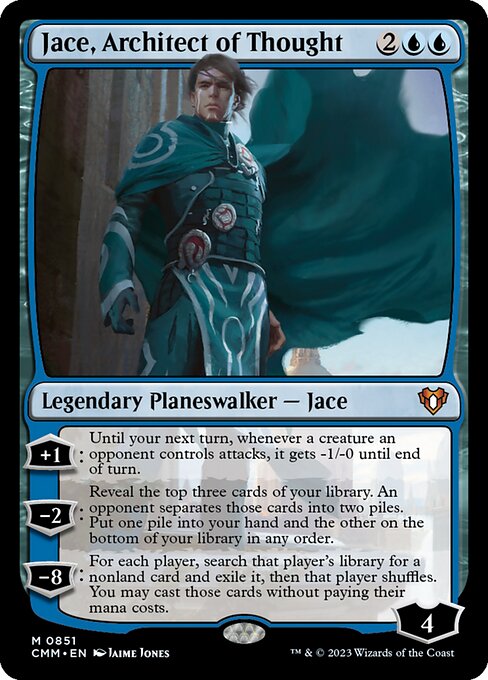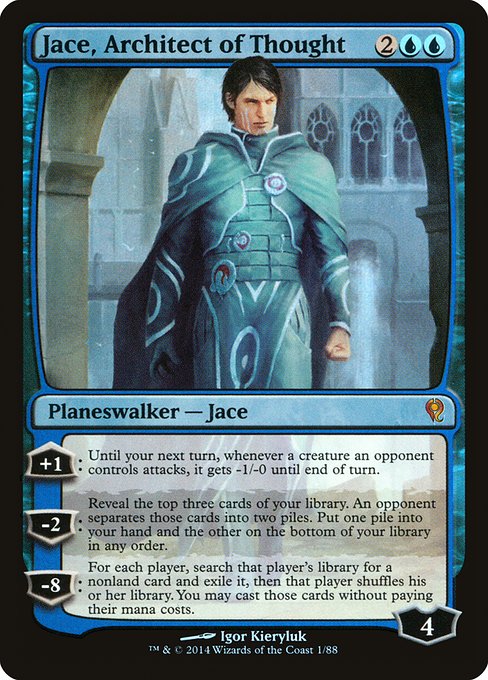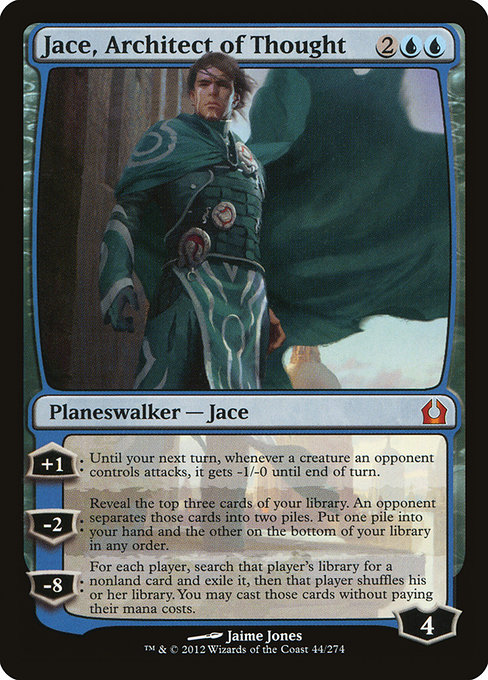Jace, architecte des pensées
Planeswalker : Jace
+1 : Jusqu'à votre prochain tour, à chaque fois qu'une créature qu'un adversaire contrôle attaque, elle gagne -1/-0 jusqu'à la fin du tour.
-2 : Révélez les trois cartes du dessus de votre bibliothèque. Un adversaire sépare ces cartes en deux tas. Mettez l'un d'eux dans votre main et l'autre au-dessous de votre bibliothèque, dans l'ordre de votre choix.
-8 : Pour chaque joueur, cherchez dans la bibliothèque de ce joueur une carte non-terrain et exilez-la, puis ce joueur mélange sa bibliothèque. Vous pouvez lancer ces cartes sans payer leur coût de mana.
-2 : Révélez les trois cartes du dessus de votre bibliothèque. Un adversaire sépare ces cartes en deux tas. Mettez l'un d'eux dans votre main et l'autre au-dessous de votre bibliothèque, dans l'ordre de votre choix.
-8 : Pour chaque joueur, cherchez dans la bibliothèque de ce joueur une carte non-terrain et exilez-la, puis ce joueur mélange sa bibliothèque. Vous pouvez lancer ces cartes sans payer leur coût de mana.
standard
future
historic
gladiator
pioneer
explorer
modern
legacy
pauper
vintage
penny
commander
brawl
alchemy
paupercommander
duel
oldschool
premodern
Rulings
For each library, the search is complete only when you explicitly say it is. For example, you can look through one player's library, set that library down, look at another player's library, choose a nonland card in the first library, then choose a nonland card in the second library. Don't reveal any cards from those libraries to any other player until you exile them.
When resolving Jace's third ability, you search each player's library (including yours) and exile the nonland cards before casting any of them.
Jace's first ability creates a delayed triggered ability that triggers whenever a creature an opponent controls attacks. It doesn't matter which player or planeswalker that creature is attacking.
You cast the cards by putting them on the stack one at a time, choosing modes, targets, and so on. The last card you cast will be the first one to resolve.
If a card has in its mana cost, you must choose 0 as its value.
When casting a card this way, ignore timing restrictions based on the card's type. Other timing restrictions, such as “Cast [this card] only during combat,” must be followed.
If you cast a card “without paying its mana cost,” you can't pay alternative costs such as overload costs. You can pay additional costs such as kicker costs. If the card has mandatory additional costs, you must pay those.
Piles can be empty. If one of the piles is empty, you choose to put all the revealed cards in your hand or on the bottom of your library.
You pick one of your opponents when Jace's second ability resolves. The ability doesn't target that opponent. All players may see the revealed cards and offer opinions. You (not your opponent) choose which pile is put into your hand and which pile is put on the bottom of your library.
If you can't cast a card, perhaps because there are no legal targets available, or if you choose not to cast one, it will remain exiled. Jace's ability won't allow you to cast it later.
When resolving Jace's third ability, you search each player's library (including yours) and exile the nonland cards before casting any of them.
Jace's first ability creates a delayed triggered ability that triggers whenever a creature an opponent controls attacks. It doesn't matter which player or planeswalker that creature is attacking.
You cast the cards by putting them on the stack one at a time, choosing modes, targets, and so on. The last card you cast will be the first one to resolve.
If a card has in its mana cost, you must choose 0 as its value.
When casting a card this way, ignore timing restrictions based on the card's type. Other timing restrictions, such as “Cast [this card] only during combat,” must be followed.
If you cast a card “without paying its mana cost,” you can't pay alternative costs such as overload costs. You can pay additional costs such as kicker costs. If the card has mandatory additional costs, you must pay those.
Piles can be empty. If one of the piles is empty, you choose to put all the revealed cards in your hand or on the bottom of your library.
You pick one of your opponents when Jace's second ability resolves. The ability doesn't target that opponent. All players may see the revealed cards and offer opinions. You (not your opponent) choose which pile is put into your hand and which pile is put on the bottom of your library.
If you can't cast a card, perhaps because there are no legal targets available, or if you choose not to cast one, it will remain exiled. Jace's ability won't allow you to cast it later.
Rulings
For each library, the search is complete only when you explicitly say it is. For example, you can look through one player's library, set that library down, look at another player's library, choose a nonland card in the first library, then choose a nonland card in the second library. Don't reveal any cards from those libraries to any other player until you exile them.
When resolving Jace's third ability, you search each player's library (including yours) and exile the nonland cards before casting any of them.
Jace's first ability creates a delayed triggered ability that triggers whenever a creature an opponent controls attacks. It doesn't matter which player or planeswalker that creature is attacking.
You cast the cards by putting them on the stack one at a time, choosing modes, targets, and so on. The last card you cast will be the first one to resolve.
If a card has in its mana cost, you must choose 0 as its value.
When casting a card this way, ignore timing restrictions based on the card's type. Other timing restrictions, such as “Cast [this card] only during combat,” must be followed.
If you cast a card “without paying its mana cost,” you can't pay alternative costs such as overload costs. You can pay additional costs such as kicker costs. If the card has mandatory additional costs, you must pay those.
Piles can be empty. If one of the piles is empty, you choose to put all the revealed cards in your hand or on the bottom of your library.
You pick one of your opponents when Jace's second ability resolves. The ability doesn't target that opponent. All players may see the revealed cards and offer opinions. You (not your opponent) choose which pile is put into your hand and which pile is put on the bottom of your library.
If you can't cast a card, perhaps because there are no legal targets available, or if you choose not to cast one, it will remain exiled. Jace's ability won't allow you to cast it later.
When resolving Jace's third ability, you search each player's library (including yours) and exile the nonland cards before casting any of them.
Jace's first ability creates a delayed triggered ability that triggers whenever a creature an opponent controls attacks. It doesn't matter which player or planeswalker that creature is attacking.
You cast the cards by putting them on the stack one at a time, choosing modes, targets, and so on. The last card you cast will be the first one to resolve.
If a card has in its mana cost, you must choose 0 as its value.
When casting a card this way, ignore timing restrictions based on the card's type. Other timing restrictions, such as “Cast [this card] only during combat,” must be followed.
If you cast a card “without paying its mana cost,” you can't pay alternative costs such as overload costs. You can pay additional costs such as kicker costs. If the card has mandatory additional costs, you must pay those.
Piles can be empty. If one of the piles is empty, you choose to put all the revealed cards in your hand or on the bottom of your library.
You pick one of your opponents when Jace's second ability resolves. The ability doesn't target that opponent. All players may see the revealed cards and offer opinions. You (not your opponent) choose which pile is put into your hand and which pile is put on the bottom of your library.
If you can't cast a card, perhaps because there are no legal targets available, or if you choose not to cast one, it will remain exiled. Jace's ability won't allow you to cast it later.
Your collection? Your decks?
Want to manage your collection and/or create decks?
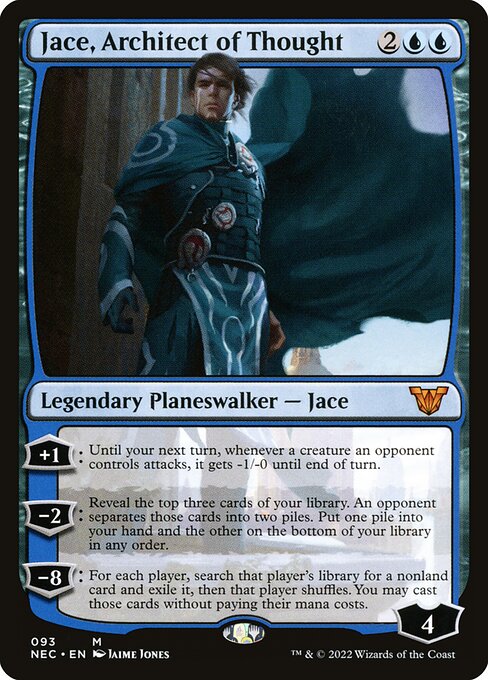

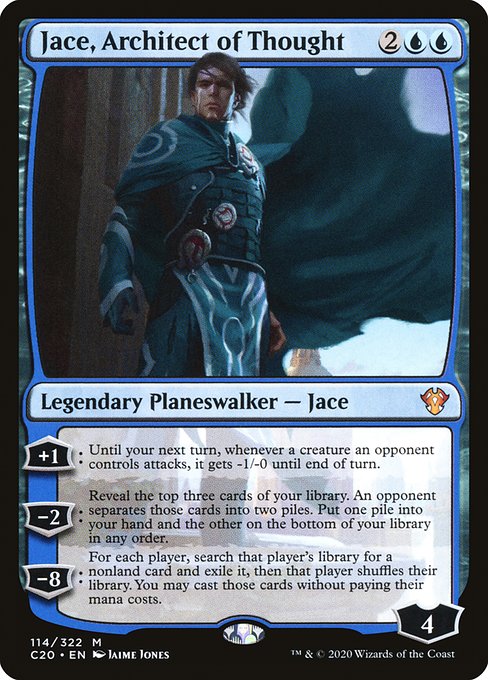
 0
0
 0.32€
0.32€
